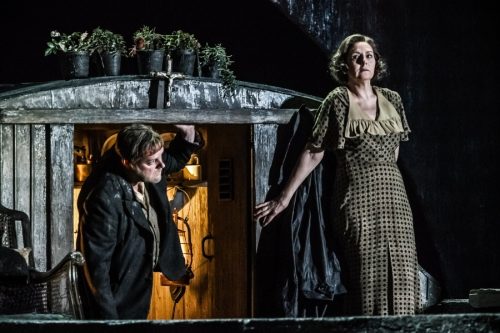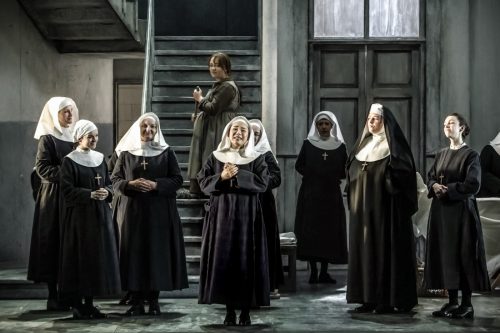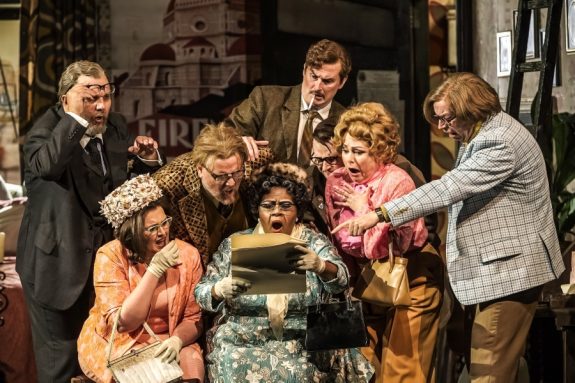 United Kingdom Puccini, Il trittico: Soloists, Welsh National Opera Chorus and Orchestra / Carlo Rizzi (conductor). Wales Millennium Centre, Cardiff, 22.6.2024. (CR)
United Kingdom Puccini, Il trittico: Soloists, Welsh National Opera Chorus and Orchestra / Carlo Rizzi (conductor). Wales Millennium Centre, Cardiff, 22.6.2024. (CR)

The three operas of Puccini’s ‘triptych’ are probably more often seen singly or in combinations of a pair, rather than all three together in one evening, as intended by the composer. On the occasion of the centenary of his death, Welsh National Opera mount a new production by Sir David McVicar (shared with Scottish Opera) which, for better or worse, does not utilise any unifying theme or idea across all three parts, but simply and successfully creates a vividly immediate and essentially realist setting for each drama.
There is, however, a clear chronological progression in the sequence, starting with Il tabarro in its crepuscular, smoky canalside setting in the back streets of Paris, plausibly around 1910, as in the original stage directions. Claustrophobic as Michele and Giorgetta’s barge is, it still appears to be a more inviting habitat than the forbidding, unwelcoming environment on dry land. Suor Angelica presents the interior of a grimly austere convent, with a rickety staircase centre stage, Angelica’s herbal workshop to one side and the chapel on the other. A picture of Pius XII dates the action to a specific period between 1939 and 1958 – if not necessarily during the Second World War (no reference is made to that) then at least seemingly during the period of privation after it, which would make more poignantly ironic the one episode of humour in this opera when Sister Dolcina is teased for her predilection for eating good things, at a time when nobody had the luxury of a full diet. As the Pope around whom controversy still circulates as to what extent he failed to take a bolder stance against Hitler and Nazism, there is perhaps the idea of moral compromise, counterpointing that of the heartless treatment of Angelica by her family, and the rather loveless, unjoyful world witnessed within the convent. In a broader emotional sense, the austere setting enables the dramatic point to be made effectively when the golden glow of the setting sun breaks through into the convent as a transitory, misinterpreted symbol of hope. Angelica’s tragedy is echoed by the silent extras of two cleaners, one of whom is visibly struggling with some sorrow of her own and bursts into tears. But another note of humour is introduced on stage when Sister Osmina stomps up the stairs, like a berated schoolgirl being sent to her room when she is reprimanded for giving in to her desires.
Gianni Schicchi moves on to 1971, as we learn from the comically fraudulent dictation of Buoso Donati’s alternative will. That era is colourfully and faithfully recreated in Donati’s chaotically organised chamber with its various references to Florence, oozing farce and comical mishap even before any lines are sung. As much as anything, though, it is the vivacious choreography and acting by the singers which winningly brings this opera to life, with its sharp satire and irony.

Roland Wood is as sharp witted and poised in the title role of the latter, as he is pensive and brooding as Michele in Il tabarro; his well-contrasted vocal personas as Schicchi and pretending to be the mortally ill Donati is a masterclass in musical acting. Alexia Voulgaridou is Michele’s disillusioned wife Giorgetta, steely and defiant there, whereas in the role of Sister Angelica she expresses vulnerability and sadness with exemplary control and precision, especially in a flowing account of ‘Senza mamma’ which avoids sentimentality. Leonardo Caimi sings with unforced lustre as Giorgetta’s paramour, Luigi, while Haegee Lee and Oleksiy Palchykov, as the romantic leads in Gianni Schicchi, are delightfully spry, the latter urgent and ringing in his excitable little number, and Lee singing with charm and zeal which makes for a fresh, rather than gushing rendition of ‘O mio babbino caro’.
Tichina Vaughn is coldly imperious as The Princess, sweeping in and demanding that her niece, Angelica, sign over her inheritance, with a touch of reedy callousness in her voice, which is softened a bit for her haughty counterpart in Gianni Schicchi, Zita, the mother of Rinuccio who regards Lauretta as unworthy to marry her son, and carrying all the airs and graces of a Hyacinth Bucket. Other roles are taken as characterfully, especially in Gianni Schicchi, but there is an idiomatic conversational alacrity in much of the musical dialogue of Suor Angelica, and there are creditable appearances from Daniel Norman, Wojtek Gierlach, and Alison Kettlewell in the smaller roles of Il tabarro, acting as foils to the main drama.
WNO’s conductor laureate, Carlo Rizzi, leads the performances with instinctive flair for the character of each opera’s score. Despite Il tabarro’s dark set and drama, he draws from the orchestra a certain luminosity, in keeping with music that is clearly inspired by Debussy, though still shot through with an Italianate lyricism and ardour. Suor Angelica sustains a subtle tension and drive, despite the comparative delicacy of its completely female vocal textures. Gianni Schicchi rightly bustles along with captivating vim, imbued with all the ebullience of true opera buffa, whether that be of the eighteenth century or of Verdi’s Falstaff, to both of which Puccini’s one-act piece is a worthy successor. For my part, the production is worth seeing just for that last opera alone, but the contrasts and shifts in tone and register are compellingly traced in all three parts of this glorious triptych.
Curtis Rogers
Featured Image: WNO’s Gianni Schicchi © Craig Fuller
Il tabarro
Michele – Roland Wood
Giorgetta – Alexia Voulgaridou
Luigi – Leonardo Caimi
Tinca – Daniel Norman
Talpa – Wojtek Gierlach
La Frugola – Alison Kettlewell
Song seller – Osian Wyn Bowen
Young Lovers – Haegee Lee, Oleksiy Palchykov
Suor Angelica
Sister Angelica – Alexia Voulgaridou
The Princess – Tichina Vaughn
Abbess – Sioned Gwen Davies
Sister Genovieffa – Haegee Lee
The Mistress of the Novices – Helen Jarmany
Novice – Alys Roberts
The Sister Monitor – Sophie Yellans
Sister Osmina – Sarah Pope
Sister Docina – Monika Sawa
The Infirmary Sister – Alison Kettlewell
First Alms Sister – Emily Christina Loftus
The Sister Monitor – Sophie Yellans
Second Alms Sister – Angharad Morgan
First Postulant – Claire Hampton
Second Postulant – Beca Davies
Sister Lucilla – Joanne Boag
Dispensing Sister – Carolyn Jackson
Gianni Schicchi
Gianni Schicchi – Roland Wood
Lauretta – Haegee Lee
Zita – Tichina Vaughn
Rinuccio – Oleksiy Palchykov
Gherardo – Daniel Norman
Nella – Fiona Harrison-Wolfe
Betto di Signa – Benjamin Bevan
Simone – Wojtek Gierlach
Marco – James Cleverton
La Ciesca – Sioned Gwen Davies
Maestro Spinelloccio – Julian Boyce
Ser Amantio di Nicolao – Alastair Moore
Pinellino – Stephen Wells
Guccio – Jasey Hall
Production:
Director – Sir David McVicar
Revival Director – Greg Eldridge
Set designer – Charles Edwards
Costume designer – Hannah Clark
Lighting designer – Ben Pickersgill
Movement director – Gareth Mole
Fight director – Maisie Carter
Chorus master – Frederick Brown
